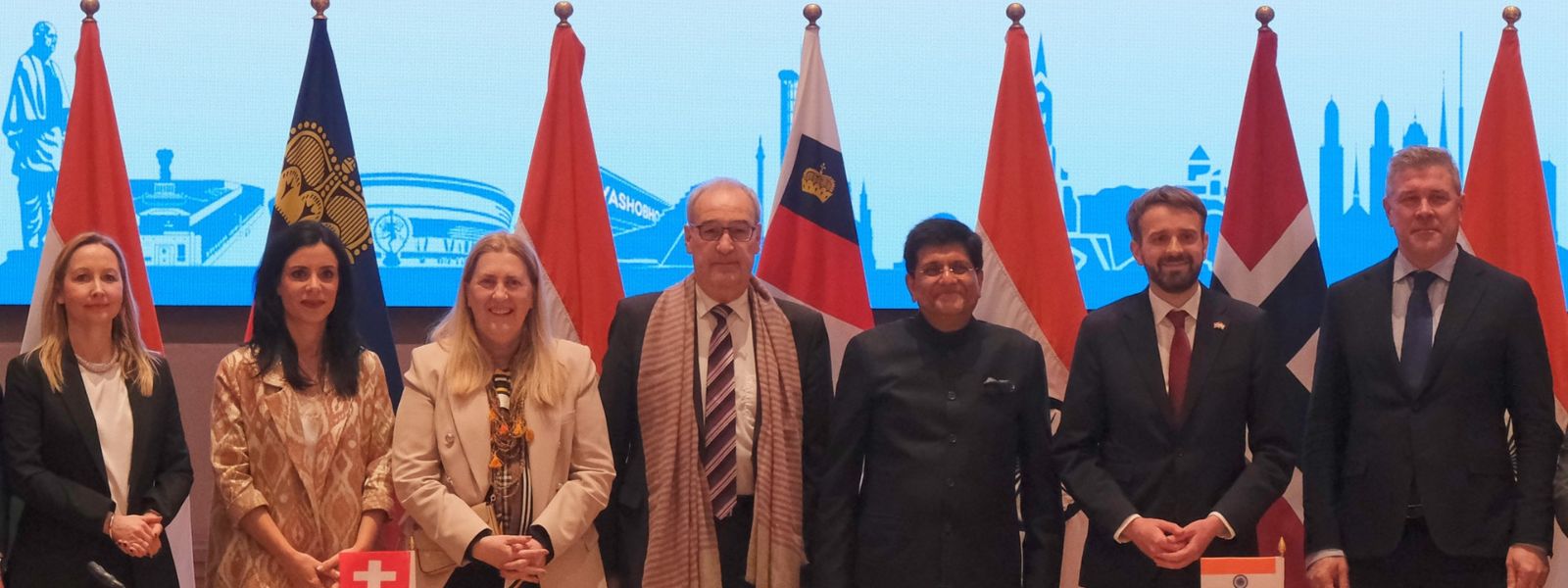.webp)

India Signs $100bn Trade Pact With EFTA bloc
COLOMBO (News 1st): Over the weekend, the European Free Trade Association (EFTA) States – Iceland, Liechtenstein, Norway, and Switzerland – and India signed a Trade and Economic Partnership Agreement (TEPA).
The negotiations between EFTA and India started in 2008, 21 rounds of negotiations were needed to reach an agreement on 10 March 2024.
The agreement comprises of 14 chapters with main focus on market access related to goods, rules of origin, trade facilitation, trade remedies, sanitary and phytosanitary measures, technical barriers to trade, investment promotion, market access on services, intellectual property rights, trade and sustainable development and other legal and horizontal provisions.
The highlights of the agreement are:
EFTA has committed to promote investments with the aim to increase the stock of foreign direct investments by USD 100 billion in India in the next 15 years, and to facilitate the generation of 1 million direct employment in India, through such investments. The investments do not cover foreign portfolio investment.
For the first ever time in the history of FTAs, a legal commitment is being made about promoting target-oriented investment and creation of jobs.
EFTA is offering 92.2% of its tariff lines which covers 99.6% of India’s exports. The EFTA’s market access offer covers 100% of non-agri products and tariff concession on Processed Agricultural Products (PAP).
India is offering 82.7% of its tariff lines which covers 95.3% of EFTA exports of which more than 80% import is Gold. The effective duty on Gold remains untouched.Sensitivity related to PLI in sectors such as pharma, medical devices & processed food etc. have been taken while extending offers. Sectors such as dairy, soya, coal and sensitive agricultural products are kept in exclusion list.
India has offered 105 sub-sectors to the EFTA and secured commitments in 128 sub-sectors from Switzerland, 114 from Norway, 107 from Liechtenstein, and 110 from Iceland.
TEPA would stimulate Indiam services exports in sectors of its key strength / interest such as IT services, business services, personal, cultural, sporting and recreational services, other education services, audio-visual services etc.
Services offers from EFTA include better access through digital delivery of Services (Mode 1), commercial presence (Mode 3) and improved commitments and certainty for entry and temporary stay of key personnel (Mode 4).
TEPA has provisions for Mutual Recognition Agreements in Professional Services like nursing, chartered accountants, architects etc.
Commitments related to Intellectual Property Rights in TEPA are at TRIPS level. The IPR chapter with Switzerland, which has high standard for IPR,shows our robust IPR regime
India’s interests in generic medicines and concerns related to evergreening of patents have been fully addressed.
India signals its commitment to Sustainable development, inclusive growth, social development and environmental protection
Fosters transparency, efficiency, simplification, harmonization and consistency of trade procedures.
TEPA will empower our exporters access to specialized inputs and create conducive trade and investment environment. This would boost exports of Indian made goods as well as provide opportunities for services sector to access more markets.
TEPA provides an opportunity to integrate into EU markets. Over 40% of Switzerland’s global services exports are to the EU. Indian companies can look to Switzerland as a base for extending its market reach to EU.
TEPA will give impetus to “Make in India” and Atmanirbhar Bharat by encouraging domestic manufacturing in sectors such as Infrastructure and Connectivity, Manufacturing, Machinery, Pharmaceuticals, Chemicals, Food Processing, Transport and Logistics, Banking and Financial Services and Insurance.
TEPA would accelerate creation of large number of direct jobs for India’s young aspirational workforce in next 15 years in India, including better facilities for vocational and technical training.
TEPA also facilitates technology collaboration and access to world leading technologies in precision engineering, health sciences, renewable energy, Innovation and R&D.
Other Articles
Featured News





.png )








-774784_550x300.jpg)
-774560_550x300.jpg)










.webp)






